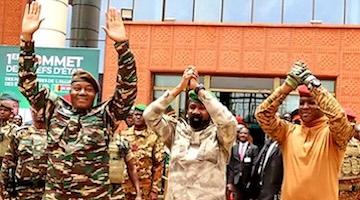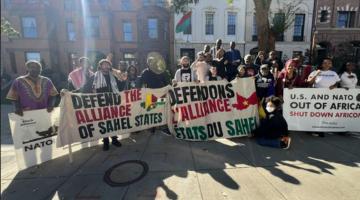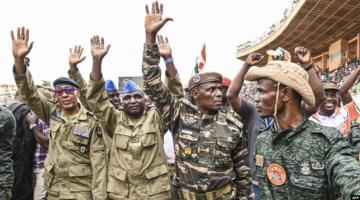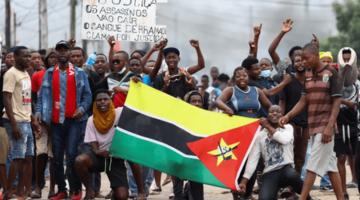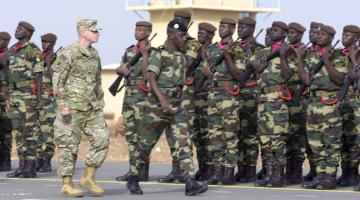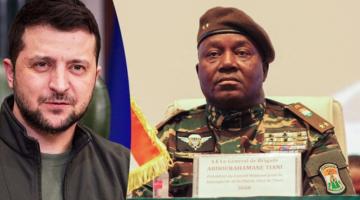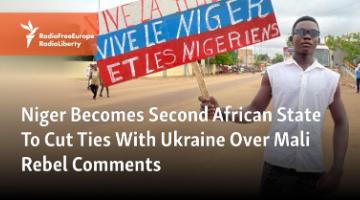Libyan security forces affiliated with Tripoli-based interim Prime Minister Abdul Hamid Dbeibah in the northwestern city of Misrata (Courtesy AFP)
The impact of the U.S./NATO destruction of the Libyan state is still being felt. AFRICOM is still the great destabilizer of the entire African continent.
Originally published in Black Alliance for Peace.
Libya, once a prosperous and peaceful country, has been ravaged by a war between armed factions backed by regional and global players ever since the 2011 NATO-led invasion. The war and destruction have significantly destabilized the country, and armed groups now openly operate.
Countries seeking regional influence and aspiring to control Libyan oil have been exploiting political and ideological differences among the ruling elite in Libya, sowing the seeds for further division and chaos. The NATO-led invasion opened up space for countries such as the United States, France, Turkey, Egypt, Russia, the United Arab Emirates and Qatar, among several others, to further their interests in the region through the Libyan conflict. However, this has come at the cost of common people.
To suppress dissent and to exploit vulnerable migrants, Libyan authorities have used various means, such as arbitrary detention, torture, rape, murder, enslavement, enforced disappearances and sexual slavery of women. The U.S./EU/NATO Axis of Domination has provided monetary and material aid to Libyan authorities and to armed militias, both of which have been responsible for widespread human-rights violations, including war crimes and crimes against humanity. This “new” scramble for Africa is causing widespread suffering for African people.
U.S. Out of Africa: Voices from the Struggle
AFRICOM Watch Bulletin speaks with Essam Abdelrasul Bubaker Elkorghli, who is a Libyan Ph.D. student at the University of Illinois at Urbana-Champaign, where he researches Libya’s modern history, state ideology and contemporary imperialism in education. He is part of the Global Pan-African Movement.
AFRICOM Watch Bulletin: How does the U.S./NATO impose the need for U.S. Africa Command (AFRICOM) to intervene, like it did in Libya?
Essam Elkorghli: Understanding AFRICOM’s recent activities in Libya must be integrated in a broader understanding of the history of Libya and how the aftermath of NATO’s intervention in Libya enabled AFRICOM to infiltrate the country’s security apparatus. Libya’s military was destroyed by NATO and its regional allies, laying the groundwork for a weakened state that is dependent on foreign actors to conduct its security operations in the country. The destruction of Libya and its military in 2011 manufactured the need for more Western intervention. This form of imperialism results in the forced integration of the South with the North based on a relationship of dependency, and in this case, it is security dependency.
AWB: Who are the Libyans that invited AFRICOM to start its mission in Libya and what role did they play in the toppling of Muammar Qaddafi?
Elkorghli: AFRICOM partook in the destruction of Libya under the guise of NATO’s 2011 mission. However, as Security Council Resolution 1973 ended by the elimination of the regime, their operations stopped. Nonetheless, when the groups armed by NATO in 2011 started to claim territories, declare affiliation to the Islamic State in Iraq and Syria (ISIS), and inflict endless terror on the population, calls by the newly parachuted UN authority in Libya (Government of National Accord) for another foreign intervention started. AFRICOM launched its mission in Libya in August 2016 in the city of Sirte to help the GNA’s fight against local Islamic State elements. The GNA was not elected by Libyans, but their composition includes a large proportion of the people who fought against the former regime and are predominantly [members of the right-wing political group] Muslim Brotherhood.
AWB: The explanation given for the recent visit by William Burns, CIA chief, was “security issues.” Is that merely coded pretext for the expansion of AFRICOM or are there legitimate security concerns? And, if not via AFRICOM, how do you envision those concerns being addressed?
Elkorghli: UN estimates that there are 20,000 foreign mercenaries in Libya. These foreign groups are tied to nation states and are not clandestine militias, as the AFRICOM purports. The recent visit by the head of the CIA to Libya was largely driven by the fact that there is an adversarial group in Libya that must be combatted, which is the private [Russian] military, Wagner Group. The visit comes merely two days after that very group defeated NATO-backed troops in the strategic city of Soledar in Ukraine. The fact that a private military group defeated NATO and its allies in Ukraine is the security issue for the CIA because the group and its operations in the Sahel is materializing more fortuitous results than [the] French or AFRICOM presence in the region. In other words, wherever AFRICOM and French troops existed, there is an expansion of terror activities. The group’s presence is presumably a security issue for AFRICOM, especially following their role in the Ukraine war.
AWB: Regarding the airstrikes that killed 11 Libyan civilians, is it your sense that AFRICOM is indifferent or that it is actually intentional. And, if intentional, what would be their ultimate objective?
Elkorghli: AFRICOM’s operations did not end with the objective of eliminating terrorist elements in the city of Sirte in 2016. They continued their operations to our very day. This has had consequential reverberations on the social fabric of Libyan society. AFRICOM collaborates with GNA (and currently Government of National Unity, formed in 2021 with the aim of unifying the GNA with the rival Tobruk-based government) to target marginalized groups in the south, who have been deprived of social services and access to health care and education. The Tebu and Tuareg tribes in the south have been framed to aid in terror activities, which legitimizes the excessive use of violence against the civilian population. The killing of 11 civilians under the pretext of terrorism shows the level of impunity these military operations enjoy, especially when the local government lacks popular legitimacy and their reign is largely guarded by how the West grants them legitimacy. These airstrikes should be viewed from the forced integration of Libya with AFRICOM’s security apparatus, which renders Libya a security dependent state.
AWB: There are clearly multiple groups/factions on the ground in Libya, all with their own agendas. Is there a constructive role for the African Union (AU) to play in the process of rebuilding Libya?
Elkorghli: The AU’s involvement since 2011 has been circumscribed by NATO and its allies. In 2011, the AU was barred from traveling to Libya and was threatened by NATO that Libyan airspace should not be approached—ironic how African airspace is controlled by NATO. The AU also saw that successive Libyan governments parachuted by the UN were not interested in the former regime’s orientation of integrating Libya with Africa. This has resulted in limited engagement with the AU, which is reciprocated by the AU’s divided attention on Libya. However, given that the AU has not proliferated the destruction of Libya, always called for genuine peaceful solutions to conflicts between different groups, and consistently called for de-escalation, they do have a role in the reconstruction of Libya. If a group of influential African states (for example, South Africa, Nigeria, Tanzania, Algeria and Ghana, to name a few) could consolidate their efforts to conjure a plan for Libyan factions to meet in Libya for a Libyan-Libyan dialogue, this would sideline any efforts for the U.S./EU to select a few elites and reproduce the same results that the [United Nations Support Mission in Libya] UNSMIL has driven.
AWB: How can Africans worldwide, particularly those of us who espouse a Pan-Africanist perspective, best act in solidarity with the masses of Libyan people?
Elkorghli: There are a select few actors in Libya who have garnered international legitimacy by being subservient to the interests of the U.S./EU/NATO and transnational capital. These state actors do not represent the Libyan masses. The Libyans masses long for a dignified life, sovereign land and control of [their] resources. The history and fate of Libya is linked directly to the fate and history of the rest of Africa, whether through anti-colonial struggles or through the re-emergence of neocolonial interests, where the African continent has become NATO’s southern neighborhood. As Pan-Africanists, we should understand the malign and divisive interests of the West in further plundering Africa; we must act in unison against the neocolonial onslaught against Africa and its people; we must oppose the current trajectory of increased militarization (except in self-defense); silence the guns; and understand that our struggles are one—sovereignty over our lands, seas and air.
NEWS AND ANALYSIS
Gerald Horne on Sudan: Almost 100 Dead in Fighting Between Army and Paramilitary Forces & role of US
April 17, 2023 by The Critical Hour
Dr. Gerald Horne, Professor of History at the University of Houston, author, historian, and researcher, on The Critical Hour, discussing Sudan: Almost 100 Dead in Fighting Between Army and Paramilitary Forces & role of U.S.
As Army and Rapid Support Forces battle it out, Sudanese left calls for restoring the revolution
April 15, 2023 by Pavan Kulkarni of Peoples Dispatch
The Sudanese army and the paramilitary Rapid Support Forces have begun fighting each other. The root of the conflict lies in disagreements over integrating the paramilitary into the army. The Sudanese left has noted that both parties seek to escalate armed conflict, so that it can be used as a reason to not hand over power to civilian forces.
Life or Debt: The Stranglehold of Neocolonialism and Africa’s Search for Alternatives
April 11, 2023 by Tricontinental: Institute for Social Research
The International Finance Institutions—mainly the IMF—exacerbate the poverty brought on by colonialism and transform it into a permanent debt crisis. This dossier explores that topic and moves into a deeper assessment of the contradictions of sovereign debt on the African continent.
Debunking the U.S.-led Hypocrisy Summit
April 11, 2023 by WPFW 89.3 FM - Voices With Vision
Imani Umoja of the African Party for the Independence of Guinea and Cape Verde (PAIGC) and the All-African People’s Revolutionary Party, as well as a member of the Steering Committee of BAP's U.S. Out of Africa Network, spoke about the U.S.-led Democracy Summit held in Zambia, March 28-30. The conversation was preceded by comments by Dr. Fred M’membe, president of the Socialist Party in Zambia, about that conference and U.S. imperialist arrogance.
AFRICOM: Securing African or U.S. interests?
April 5, 2023 by African Stream
The United States Africa Command—or AFRICOM—was founded in 2007. But it has failed to bring peace and security. Major failures in Somalia, Libya and elsewhere have left many Africans suspecting it exists only to serve U.S. interests.
The long arm of Washington extends into Africa’s Sahel
March 25, 2023 translation by Vijay Prashad
U.S. Secretary of State Antony Blinken’s visit to Niger and its offer of $150 million do not hide that its main interest lies in security cooperation.
Israel’s Humiliating Expulsion from AU Summit Exposes Its Failed Diplomacy in Africa
March 22, 2023 by Ramzy Baroud
The removal of Israel’s Observer Status in the African Union reflects the broader trend of geopolitical spaces opening up for countries in the Global South and the increasing challenge to the hegemony of former colonial powers.
Libya Hearing: International People's Tribunal on US Imperialism
March 10, 2023 by
The sanctions as one of the key tools of U.S. imperialism. In order to uncover the depth and breadth of U.S. imperialism, we will determine the impact of sanctions on various aspects of life, with a focus on social, political, economic, and ecological issues.


